Describe the solution to the following system of linear equations: y = 3x - 6 and 2y - 4 = 6z.

Understand the Problem
The question is asking to determine the nature of the solution to the given system of linear equations, specifically whether it has one solution, no solution, infinite solutions, or exactly two solutions.
Answer
There are infinite solutions.
Answer for screen readers
There are infinite solutions.
Steps to Solve
-
Rewrite the Equations Start by writing the given equations clearly. We have:
- Equation 1: ( y = 3x - 6 )
- Equation 2: ( 2y - 4 = 6z )
-
Substitute (y) into the Second Equation Substitute ( y ) from Equation 1 into Equation 2: $$ 2(3x - 6) - 4 = 6z $$ This simplifies to: $$ 6x - 12 - 4 = 6z $$ Further simplifying gives: $$ 6x - 16 = 6z $$
-
Rearrange to Find Relationships Rearranging the equation results in: $$ z = x - \frac{16}{6} $$ or $$ z = x - \frac{8}{3} $$
-
Interpret the Result The relationship ( z = x - \frac{8}{3} ) indicates that ( z ) is dependent on ( x ). Therefore, for any value of ( x ), there will be a corresponding value of ( z ) which allows for infinite solutions in terms of ( (x, y, z) ).
There are infinite solutions.
More Information
This system of equations expresses a relationship where ( y ) and ( z ) are defined based on ( x ). This leads to a scenario where multiple combinations that satisfy the equations can exist, hence resulting in infinite solutions.
Tips
- One might overlook the dependency between the variables and prematurely conclude there is only one solution or no solutions.
- Mismanaging the substitution can lead to errors, so always recheck simplifications and rearrangements.
AI-generated content may contain errors. Please verify critical information